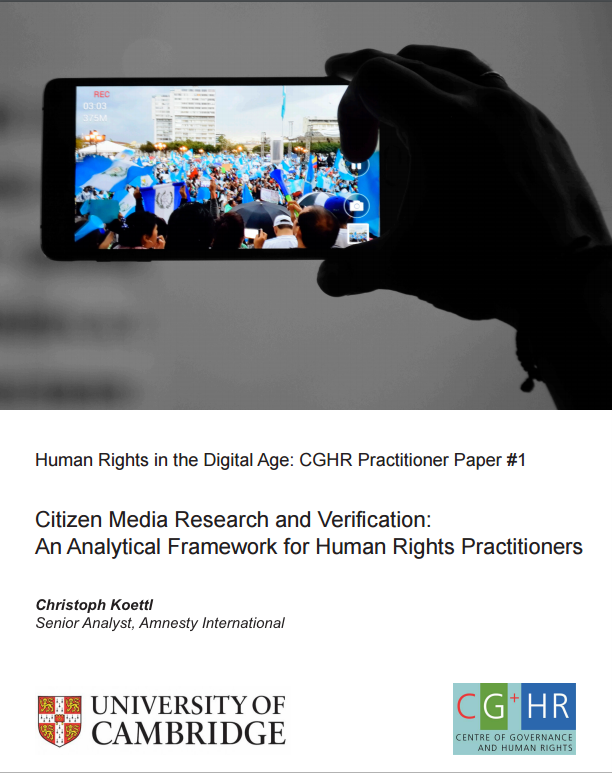Citizen Media Research and Verification: An Analytical Framework for Human Rights
Duration: 54 mins 32 secs
Share this media item:
Embed this media item:
Embed this media item:
About this item

| Description: | Launch of a report, Citizen Media Research and Verification: An Analytical Framework for Human Rights Practitioners,â by Christoph Koettl, Senior analyst at Amnesty International. The first in a new CGHR Practitioner Paper Series on âHuman Rights in the Digital Age.â |
|---|
| Created: | 2016-03-15 12:32 |
|---|---|
| Collection: |
Centre of Governance and Human Rights
Centre of Governance and Human Rights Department of Politics and International Studies |
| Publisher: | University of Cambridge |
| Copyright: | CGHR |
| Language: | eng (English) |
| Keywords: | Human Rights; verification; citizen media; human rights practice; open source information; human rights documentation; |
| Abstract: | Christoph Koettl, Senior Analyst at Amnesty International, launches his new report, âCitizen Media Research and Verification: An Analytical Framework for Human Rights Practitioners,â at this event co-hosted by the Researching (with) Social Media group and the Centre of Governance and Human Rights.
This report, the first in a new CGHR Practitioner Paper Series on âHuman Rights in the Digital Age,â examines the role of open source research in human rights fact-finding and addresses a gap in the current literature â which lacks a human rights perspective, is dominated by journalistic approaches, or focuses on specific tools. The report focuses on citizen media, the visual subset of open source information, and provides a practitionerâs perspective that is based on several years of analysing open source materials for a global human rights group. It includes case studies on video and image verification and identifies best and worst practices. The author argues that open source content, specifically citizen media, can play a crucial and increasingly important role in human rights documentation, if analysed using sound and transparent methodologies based on well-established fact-finding principles. It presents, for the first time, a tool-independent analytical framework that will allow both seasoned and new human rights researchers to review and assess open source content. Specific recommendations are offered for human rights organisations, funders, academics, and technology companies in order to realise the full potential of open source content for human rights documentation. |
|---|---|
Available Formats
| Format | Quality | Bitrate | Size | |||
|---|---|---|---|---|---|---|
| MPEG-4 Video | 1280x720 | 2.98 Mbits/sec | 1.19 GB | View | Download | |
| MPEG-4 Video | 640x360 | 1.93 Mbits/sec | 793.03 MB | View | Download | |
| WebM | 1280x720 | 2.85 Mbits/sec | 1.14 GB | View | Download | |
| WebM | 640x360 | 566.7 kbits/sec | 226.35 MB | View | Download | |
| iPod Video | 480x360 | 520.24 kbits/sec | 207.79 MB | View | Download | |
| MP3 | 44100 Hz | 249.77 kbits/sec | 99.73 MB | Listen | Download | |
| Auto * | (Allows browser to choose a format it supports) | |||||

